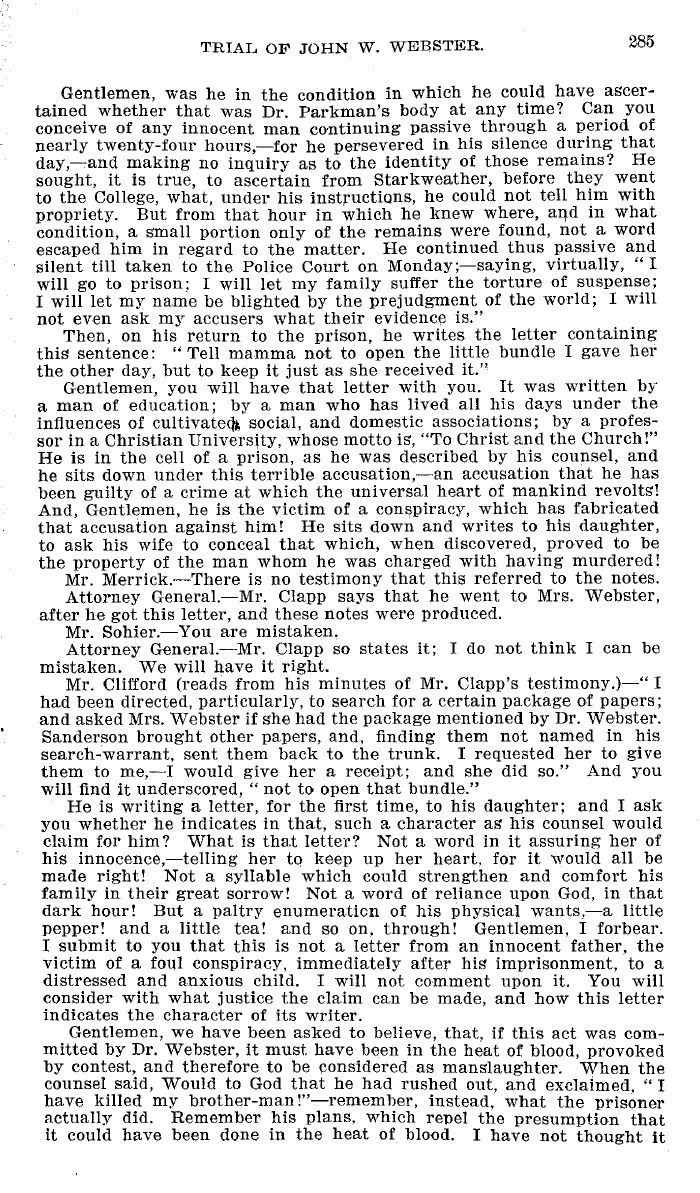|
TRIAL OF JOHN W. WEBSTER. 285
Gentlemen, was he in the condition in which he could have ascer-
tained whether that was Dr. Parkman's body at any time? Can you
conceive of any innocent man continuing passive through a period of
nearly twenty-four hours,-for he persevered in his silence during that
day,-and making no inquiry as to the identity of those remains? He
sought, it is true, to ascertain from Starkweather, before they went
to the College, what, under his instructions, he could not tell him with
propriety. But from that hour in which he knew where, and in what
condition, a small portion only of the remains were found, not a word
escaped him in regard to the matter. He continued thus passive and
silent till taken to the Police Court on Monday; saying, virtually, " I
will go to prison: I will let my family suffer the torture of suspense;
I will let my name be blighted by the prejudgment of the world; I will
not even ask my accusers what their evidence is."
Then, on his return to the prison, he writes the letter containing
this sentence: " Tell mamma not to open the little bundle I gave her
the other day, but to keep it just as she received it."
Gentlemen, you will have that letter with you. It was written by
a man of education; by a man who has lived all his days under the
influences of cultivated social, and domestic associations; by a profes-
sor in a Christian University, whose motto is, "To Christ and the Church!"
He is in the cell of a prison, as he was described by his counsel, and
he sits down under this terrible accusation,-an accusation that he has
been guilty of a crime at which the universal heart of mankind revolts!
And, Gentlemen, he is the victim of a conspiracy, which has fabricated
that accusation against him! He sits down and writes to his daughter,
to ask his wife to conceal that which, when discovered, proved to be
the property of the man whom he was charged with having murdered!
Mr. Merrick.-There is no testimony that this referred to the notes.
Attorney General.-Mr. Clapp says that he went to Mrs. Webster,
after he got this letter, and these notes were produced.
Mr. Sohier.-You are mistaken.
Attorney General.-Mr. Clapp so states it; I do not think I can be
mistaken. We will have it right.
Mr. Clifford (reads from his minutes of Mr. Clapp's testimony.)-" I
had been directed, particularly, to search for a certain package of papers;
and asked Mrs. Webster if she had the package mentioned by Dr. Webster.
Sanderson brought other papers, and, finding them not named in his
search-warrant, sent them back to the trunk. I requested her to give
them to me,-I would give her a receipt; and she did so." And you
will find it underscored, " not to open that bundle."
He is writing a letter, for the first time, to his daughter; and I ask
you whether he indicates in that, such a character as his counsel would
claim for him? What is that letter? Not a word in it assuring her of
his innocence,-telling her to keep up her heart, for it would all be
made right! Not a syllable which could strengthen and comfort his
family in their great sorrow! Not a word of reliance upon God, in that
dark hour! But a paltry enumeraticn of his physical wants, -a little
pepper! and a little tea! and so on, through! Gentlemen, I forbear.
I submit to you that this is not a letter from an innocent father, the
victim of a foul conspiracy, immediately after his imprisonment, to a
distressed and anxious child. I will not comment upon it. You will
consider with what justice the claim can be made, and how this letter
indicates the character of its writer.
Gentlemen, we have been asked to believe, that, if this act was com-
mitted by Dr. Webster, it must have been in the heat of blood, provoked
by contest, and therefore to be considered as manslaughter. When the
counsel said, Would to God that he had rushed out, and exclaimed, " I
have killed my brother-man!"-remember, instead, what the prisoner
actually did. Remember his plans, which repel the presumption that
it could have been done in the heat of blood. I have not thought it
|

